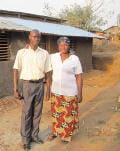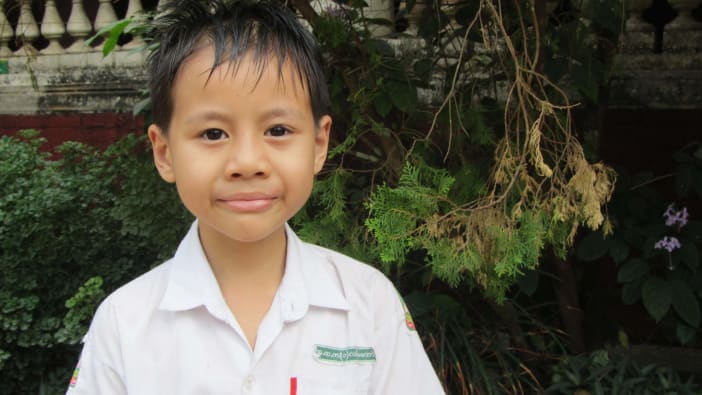Jacques decided he wanted to enrol to study Development Studies at the University of Shalom (meaning ‘peace’ in Hebrew) in Bunia, Democratic Republic of Congo (DRC).
His mother Evelyn was very sceptical about his course of study, saying ‘this is no use to us’. Things were very hard for her, particularly living with her husband. He was a mechanic and his life was all about cars. She had often asked him whether they could build a house but he had refused, preferring to spend their money on cars.
Out of the classroom
Jacques enrolled on the course. The University of Shalom uses a Church and Community Mobilisation approach as well as theological and practical reflection. As part of this he took part in an ‘internship’ of 35 days, living with a community of forest people. In this approach, small groups of students live with a community. They bring no food or water with them and walk nine kilometres to get there. They sleep on dried banana leaves, eat basic forest food and are eaten by the many insects! They work alongside their hosts, dance with them and hold ‘University by the fireside’ discussions in order to reflect with the communities about their situation.
This forest community in Atalahulu has encountered a lot of discrimination so it was very important that they were shown love as the students lived with them. After discussion, the community prioritised their needs. Firstly, they needed access to water (the clean water source was nine kilometres away). Secondly, they needed a new canoe to replace the worn out ones. Thirdly, they wanted a school for their children.
Dreams become reality
Over a period of time the community were mobilised to protect a water source, using a small grant of US$85 from the University to transport some cement and a technician to the site. All the materials and labour costs were provided by the community. The result was clean water nearer to the village.
They then built a canoe which they all pulled five kilometres to the river. It was the largest canoe they had ever built, able to carry 25 people. This project also brought together two estranged communities from opposite sides of the river.
The forest people’s children found it difficult to go to school because it was not in their village. When they could, they travelled there for a month at a time. However, with the new sense of ownership, the community built a school from local materials, including a door which they used as a blackboard. During the day it is a blackboard and at night the owner collects it and uses it as a door!
Changed thinking
Jacques reflected on this experience: ‘We learnt principles for development from the Bible and saw results. People understand it when it comes from the Bible. I was joyful seeing the forest people having clean water.’
Jacques decided to practise these same ideas with his family. He helped his father to reflect on the challenges of not owning a house, by showing him how much he was spending on rent (US$80 per month). Eventually his father was convinced and sold a car, which enabled them to buy a plot and build a house. His father wanted to remove the banked soil from the house to make the plot flat. Jacques suggested using this soil to make bricks.
Sharing with his father what he has learnt through his course has improved their relationship. His mother, Evelyn, says ‘I was amazed by all these changes. Now I want Jacques’ sister to study Development too!’
With thanks to the University of Shalom, Bunia.
Website: http://unishabunia.org/
Email: [email protected]
Telephone (+243) 99 85 07 371

Articles
‘University by the fireside’ – taking learning into the forest
Jacques' story of why he chose to study Development at University
Available in English, French, Portuguese and Spanish

From: Lifelong learning – Footsteps 90
Articles on learning from others and stories and advice from around the world

Jacques and his mother, Evelyn, near the home they built in the Democratic Republic of Congo.
Similarly Tagged Content
Share this resource
If you found this resource useful, please share it with others so they can benefit too.

Subscribe to Footsteps magazine
A free digital and print magazine for community development workers. Covering a diverse range of topics, it is published three times a year.
Sign up now - Subscribe to Footsteps magazine



